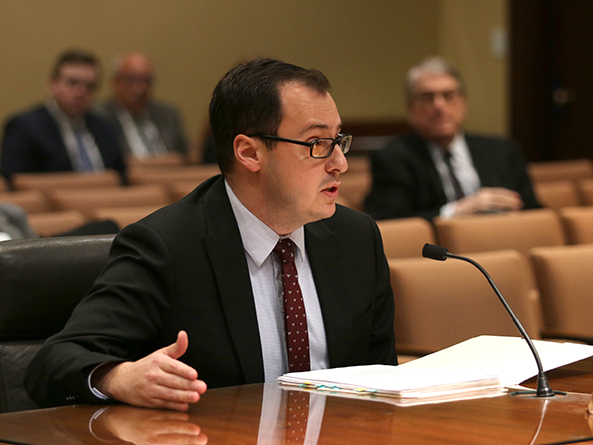NEST program expansion proposed
Nebraskans could take a tax deduction equal to contributions that their employers make to their state college savings accounts under a bill heard Jan. 29 by the Revenue Committee.
The Nebraska Education Savings Trust Plan provides tax-advantaged 529 accounts meant to encourage saving for postsecondary education costs. Contributions grow tax-deferred, and withdrawals are exempt from state and federal taxes as long as they are used for a beneficiary’s qualified higher education expenses.
Gretna Sen. Andrew La Grone, sponsor of LB1042, said the bill would ensure that employees do not have to pay state income tax on employer contributions to their NEST accounts.
Under his proposal, an individual’s federal adjusted gross income would be reduced by the amount of any contribution made by the individual’s employer into the individual’s NEST account.
The deduction would be for taxable years beginning on or after Jan. 1, 2021, and could not exceed $5,000 for those married filing separately or $10,000 for other filers.
La Grone said the bill also would eliminate the provision in current law that allows only an account’s participant, or registered owner, to take a state income tax deduction equal to contributions they make to their account, up to $5,000 for those married filing separately or $10,000 for other filers.
“This change will allow grandparents and other family members … to donate to a beneficiary’s account without having to open an additional 529 account in order to get the deduction that they are already entitled to,” he said.
LB1042 also would prohibit any state agency that provides benefits or aid to individuals based on financial need from taking employer contributions into account when determining an individual’s income.
Finally, the bill as introduced would expand the definition of qualified higher education expenses for NEST account purposes.
Under La Grone’s proposal, NEST accounts also could be used to pay for costs incurred for participation in certain apprenticeship programs and the principal or interest on any qualifying education loan of the designated beneficiary or sibling of the beneficiary.
La Grone said the expansion is meant to align state law with federal changes made last year. He said, however, that he would introduce an amendment to remove those provisions from LB1042 because of their projected cost.
The state Department of Revenue estimates that the bill would reduce state income tax revenue by $8.6 million in fiscal year 2021-22 and an additional $9.3 million in FY2022-23. The Legislative Fiscal Analyst estimates that LB1042 would reduce revenue by $17.1 million and $18.5 million in those years, respectively.
State treasurer John Murante testified in support of LB1042. Although La Grone’s expected amendment would eliminate the proposed definition change, Murante said, he would support future legislation that includes it.
Murante said Congress most likely will continue to expand the definition of qualified expenses to make 529 accounts more flexible. If Nebraska does not follow suit, he said, it will lose out to other states that allow withdrawals for those expenses.
“Nebraskans do not have to invest in NEST,” Murante said. “So the more we are restrictive, all we’re doing is incentivizing Nebraskans to go to another state and buy their plan.”
Tiffany Friesen Milone, policy director at OpenSky Policy Institute, provided neutral testimony on the bill. She said she originally planned to testify in opposition to LB1042 because of the proposed expansion of qualified expenses.
Friesen Malone said those changes would allow individuals to use NEST accounts, which are meant to encourage long-term saving, to receive short-term tax benefits by contributing to an account, deducting that amount from their taxes and then immediately withdrawing it to pay off student loans.
“If the goal is debt relief for students,” she said, “we believe there are more efficient ways to provide it that would be more predictable from a state budgeting standpoint.”
No one testified in opposition to the bill and the committee took no immediate action on it.


